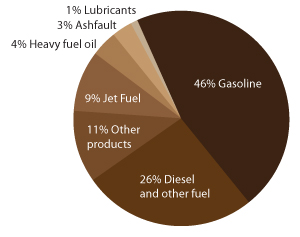 In case you had forgotten, the largest oil spill in US history happened just over a year ago. After the explosion of a drilling rig, 5 million or so gallons of oil gushed into the Gulf of Mexico over a three month period, before the pipe could be capped.
In case you had forgotten, the largest oil spill in US history happened just over a year ago. After the explosion of a drilling rig, 5 million or so gallons of oil gushed into the Gulf of Mexico over a three month period, before the pipe could be capped.
To mark the one year anniversary of their environmentally crippling spill, BP celebrated by having another oil spill, this one in Alaska. Somewhere between 2,100 and 4,200 gallons of pollutants were released into the environment after a pipeline was being pressure-tested and the pipe burst. Oil seeped into a near-by pond, harming fragile tundra.
Of all the oil companies operating, BP seems to be known as the most reckless and spill-prone. This is already their second spill in Alaska this year, and they’re still trying to clean up their image from spills in 2005 and 2006.
Since the Gulf of Mexico spill last year that captured global attention for its magnitude, there have actually been about 15 oil spills that have gone hardly-noticed. We continue to fill up our gas-guzzling vehicles at the pump, and complain about the rising price of oil, yet we aren’t making the connection between that, and the many oil spills that happen around the world.
Oil spills result in both immediate and long-term environmental damage. Some of this damage can last for decades after the spill occurs. The 1989 Exxon Valdez oil spill, which fouled the waters of Prince William Sound, coated more than a thousand miles of coastline in the sticky substance. It killed birds, fish and animals. Now, more than 20 years after the accident, and despite clean-up efforts worth billions, crude oil can still be found under the rocks and sand on the beaches of southwest Alaska.
The 2010 BP Gulf of Mexico spill happened during the prime nesting period for a number of seabirds, and as a result, many of them died. This spill will have an effect on entire species of birds whose migratory stops and nesting grounds were polluted. An oil spill is a death sentence for seabirds and shoreline birds such as pelicans, who, for survival, rely on swimming and diving into the water for food.
The effects of an oil spill are just as harmful to marine animals and fish, but less visible. Whales and dolphins get oil stuck in their blow holes, submitting them to a slow, suffocating death. Sea otters and seals suffer from hypothermia as the oil seeps into their protective fur coats. Sea turtles are harmed by the oil they encounter in the water and on the beach where they lay their eggs. These animals lose their food supply because the fish, shellfish and vegetation they eat have been affected by the oil too and are either dead, or toxic to eat.
The cleanup of an oil spill is also harmful to the environment. The dispersants used to most successfully clean up an oil spill are more toxic to coral reefs than the oil itself. Rapid and widespread death, and delay in growth rates of coral colonies happen, even at the doses of dispersant recommended by the manufacturer.
Oil companies need to tighten their safety laws to help prevent spills from happening. But as long as people use their vehicles for everything, and buy products without considering their manufacturing history or packaging, companies such as BP will continue to drill deeper and deeper in search of the substance. The truth is, we live in a world that is completely dependent on oil, and one day it will run out. But before it does, it will have had a huge environmental impact on our planet.
There are things we can do to lessen our daily dependence on oil, and every drop we save, is a drop BP won’t be drilling for. I try to use my car as little as possible. I no longer use it to get to work, opting for my bike instead. This also allows me to get a good dose of daily exercise. I try to buy as little plastic as possible, and the majority of my groceries are locally grown.
It’s human nature to forget about something when it no longer seems sensational. We have very short attention spans. But we have to remember that even though the media is no longer reporting on the Gulf of Mexico oil spill, much of the oil that spilled still remains, and will remain for years to come.
Informative article Caroline – I too am disgusted with the events in the Gulf. However I wonder if the state of affairs is as bad as reported. I read recently that oil has been seeping from the bedrock into the Gulf for millenia. Naturally occurring bacteria converts it to an inert substance. This has been happening for eons and is occuring presently as a result of the recent accidental spill. With time the Gulf will return to normal – more quickly than we anticipated. Then again maybe I’m looking for something positive out of this awful occurance.